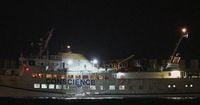On October 8, 2025, a flotilla of nine boats set sail across the Mediterranean Sea, carrying hundreds of activists, journalists, and medical professionals determined to break Israel’s naval blockade of Gaza and deliver much-needed humanitarian aid. Among those on board were Canadian epidemiologist and activist Nimâ Machouf, European lawmakers, Indigenous rights advocates, and even climate campaigner Greta Thunberg. Their mission, however, was abruptly halted when Israeli military forces intercepted the convoy, sparking a wave of international condemnation and a complex diplomatic scramble to secure the activists’ release.
According to The Canadian Press, Machouf was one of several Canadians aboard the main vessel, The Conscience, which was carrying 93 journalists, doctors, and activists. The Freedom Flotilla Coalition (FFC), the international network organizing the mission, stated that Israeli forces targeted The Conscience before intercepting three smaller boats. The FFC reported that passengers were being held in “unknown conditions,” fueling anxiety among families and supporters back home.
Machouf’s husband, Amir Khadir—a former Québec solidaire MNA—shared his relief that she would soon be back in Montreal, but he was quick to temper joy with sorrow. “We are very proud of her,” Khadir told The Canadian Press. “We are relieved that nothing too extreme happened to her.” Yet, he added, “the misery of the Palestinian people will not end just because Nimâ came back.”
Machouf was deported to Istanbul by Israeli authorities and expected to land at Montreal Trudeau International Airport on October 12, 2025. She was not alone in her ordeal. Five other Canadians were part of the mission, including Indigenous rights activist Mskwaasin Agnew, who was expected to arrive in Toronto the day before. Gur Tsabar, speaking on behalf of the Canadian contingent, confirmed that Agnew would land at Toronto’s Pearson International Airport around 4 p.m., while Khurram Musti Khan from Milton, Ontario, was also scheduled to arrive from Istanbul on Sunday evening. Three Newfoundlanders—Sadie Mees, Nikita Stapleton, and Devoney Ellis—remained detained in Israel but were slated for deportation to Jordan.
Allegations of mistreatment quickly surfaced from the activists. Khadir recounted his wife’s reports of violence: “They were ill treated, (treated with) violence, and dragged by their hair,” he said. He also heard that those intercepted were forced to kneel on the ground for hours and that some were denied their medication. These claims echoed similar accusations from other groups, including the FFC, which noted that several activists from a previous aid mission—the Global Sumud Flotilla—had alleged both physical and psychological abuse while in Israeli custody. The Israeli Foreign Ministry, for its part, has categorically denied all accusations of mistreatment.
The Israeli Ministry of Foreign Affairs described the raid as a necessary response to a “futile attempt to breach the legal naval blockade and enter a combat zone.” In a statement posted on X (formerly Twitter), the ministry said, “The vessels and the passengers are transferred to an Israeli port. All the passengers are safe and in good health. The passengers are expected to be deported promptly.”
The flotilla’s mission was not just symbolic. According to Al Jazeera and the FFC, the boats were carrying more than $110,000 worth of vital medical and nutritional aid intended for Gaza’s beleaguered hospitals. The FFC insisted, “Our flotilla poses no harm,” while also arguing that “the Israeli military has no legal jurisdiction over international waters.”
The international response was swift and, in some quarters, furious. Malaysian Prime Minister Anwar Ibrahim issued a strong condemnation of Israel’s actions and demanded the release of Malaysian citizens on board. Turkiye’s foreign ministry called the incident a “grave violation of international law” and “an act of piracy.” The flotilla’s multinational composition—activists from over 50 countries, including Irish, French, Danish, and other European nationals—added to the diplomatic complexity. European Parliament lawmaker Mélissa Camara, detained for four days at Israel’s high-security Ktzi’ot prison, was among those expected to be released and deported to Jordan, with French consular services stepping in to assist her upon arrival.
Back in France, the aftermath of the flotilla’s interception triggered its own political drama. French lawmaker Farida Amrani publicly thanked Türkiye for helping nine French nationals expelled from Israel after Paris allegedly refused to cover their repatriation costs. Amrani accused French Foreign Minister Jean-Noel Barrot of abandoning these citizens, stating, “France has decided to abandon them.” Turkish authorities and Turkish Airlines arranged onward travel for three of the French nationals to Paris, with Amrani expressing gratitude to Turkish lawmakers and consular staff for their intervention.
The scale of the Israeli operation was staggering. The week prior, more than 450 activists—including lawmakers and Greta Thunberg—were detained after over 40 boats in the Global Sumud Flotilla attempted to reach Gaza. Most of these detainees have since been deported, but many allege they suffered mistreatment during their time in Israeli custody. Israel, meanwhile, remains adamant that its actions were both legal and necessary, citing the ongoing conflict in Gaza and the need to prevent unauthorized access to a combat zone.
The political backdrop to these events is sobering. Since October 2023, Israeli attacks have killed nearly 67,200 Palestinians, most of them women and children, and left much of Gaza uninhabitable, according to local and United Nations sources. A recent ceasefire agreement, brokered by Qatar, Egypt, the United States, and Türkiye, offers a glimmer of hope. The 20-point plan includes the release of all Israeli captives in exchange for Palestinian prisoners, a permanent ceasefire, the disarmament of Hamas, and the reconstruction of Gaza. Indonesia has praised these mediation efforts and called for the international community to use this momentum to resume the peace process, emphasizing the two-state solution and the establishment of an independent Palestinian state.
Despite the ceasefire and promises of reconstruction, a famine has been declared by UN-backed agencies and international NGOs in Gaza since August 2025. The activists’ flotilla, with its cargo of medical and nutritional aid, was a direct response to this humanitarian crisis—a crisis that, for many, remains unresolved.
As the dust settles from the latest maritime confrontation, the activists’ ordeal has become a flashpoint in the ongoing debate over the blockade of Gaza, humanitarian access, and the responsibilities of both regional and international actors. For families awaiting loved ones in Montreal, Toronto, Paris, and beyond, the safe return of the flotilla’s passengers is a relief. Yet, as Amir Khadir so poignantly put it, the broader suffering of the Palestinian people continues, and the world’s eyes remain fixed on Gaza’s uncertain future.


